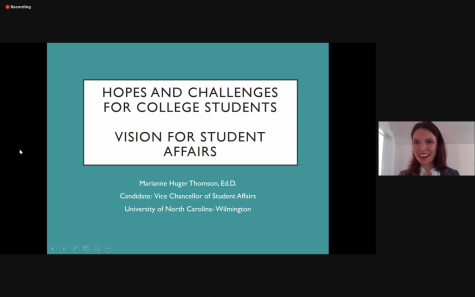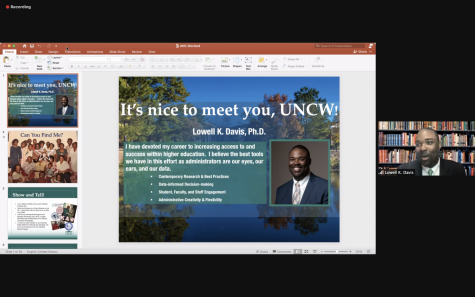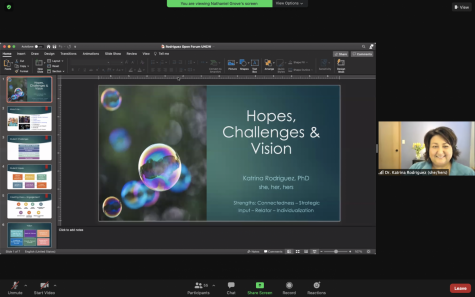UNCW hosted virtual forums with the final 3 Vice Chancellor candidates
The vice chancellor for student affairs search committee has narrowed down its search to its three final candidates. Marianne Thomson, Lowell Davis and Katrina Rodriguez, were introduced through a series of virtual open forums on Feb. 16, 18 and 22.
The search committee, made up of three co-chairs and a mix of 17 students, faculty and staff, have been working with consultants from Isaacson, Miller to narrow down the search to replace the late Pat Leonard.
During the open forums, the three candidates gave presentations about the question “What are the hopes and challenges for college students today, and your vision as vice chancellor for student affairs?” The forums also included a question and answer period at the end.
Marianne Thomson
Thomson received her masters and doctorate of education in higher education administration from The George Washington University. She has served as the associate vice president of student experience and dean of students at Syracuse University since September 2018.
During her time at Syracuse, Thomson created “an enhanced bias response program, STOP Bias.”
She previously served as the executive director of academic student services and access; senior director of Academic Support and Access Center (ASAC); associate dean of students; assistant dean of students and interim director of disability support services; and assistant dean of students at American University.
During her time at American University, Thomson created a more functional and sustainable structure for the disability support of the ASAC. In addition, she led the reorganization of academic support for disability services and student-athletes.
Thomson’s honors and certifications include NASPA Certificate for Student Affairs Law and Policy, 2019; Teamwork Award, American University, 2012; Alice Manicur Symposium for Women Aspiring to be SSAOs (NASPA), 2012, Title IX Investigator Training Certificate, Association of Title IX Administrators, 2012; and Mediation certification, American University, 2011.

“I’m in more of a strategic envisioning role and I absolutely love that space,” said Thomson. “I like to help accomplish goals. I like to make sure that we have what we need to accomplish the goals and as I’ve learned more about UNCW in this process that seems to define this university. It seems like a place that has a very strong foundation, some amazing things to build upon but also has a new vision, and a view of where it wants to go. I love jumping on a bandwagon that knows what the band is singing.”
During Thomson’s presentation, she discussed the challenges and hopes of today’s college students and how as vice chancellor she would address these things.
Her list of challenges included debt and degree inflation, overworking, mental health and graduating in a rapidly changing word. Meanwhile, her list of hopes were making an impact, creating a sense of belonging and thriving versus surviving.
“We need to help students all find their voices and learn how to use them in a useful way. We can do this by providing meaningful experiences outside of the classroom where students try on new roles where they interact with people who are very different than them, where they learn how to argue, where they learn how to work with a supervisor,” said Thomson. “We need to teach them how to budget, how to ask for a raise, how to disagree but do it civilly, those sorts of real world knowledge. I think Student Affairs is uniquely positioned to help our students with that knowledge.”
Following her presentation, Thomson took time to answer questions.
She answered questions related to her retention work, how to meet institutional needs without burning staff out, how to best serve non-traditional students, how to balance student feedback into decision-making, dealing with issues of racism on campuses and her philosophy in creating meaningful relationships in the community.
Lowell Davis
On Feb. 18, Davis gave his presentation on his challenges and hopes of college students and his plans if chosen for the position.
Davis received his master’s in counseling with an emphasis in college student development from Hampton University and his doctorate of philosophy in education, leadership and policy studies from Indiana University.
He has served as the associate vice chancellor of academic affairs and student success and a clinical assistant professor at Western Carolina University since 2013. He previously served as the assistant dean of students and assistant to the vice/acting provost for academic affairs for four years at the University of Alabama. He also served as a professor and director of new student and parent programs there as well.
Across his collegiate career he has helped raise money for various campaigns like $7.5 million for greek life at the University of Alabama and $10,000 for Western Carolina University RISA (at-risk student populations).
A few of the recent honors and awards that Davis has received include I Have A Dream Foundation “Spirit of the Dreamer” Award, 2018; Henry M. Minton Fellow, 2018; Southern (Athletic) Conference Staff Member of the Year, 2019-2020; and AACRAO, National Student Clearinghouse Research Center Award for Outstanding AACRO SEM Research Presentation, 2020.

Some of the challenges that Davis touched on during his presentation included meeting students where they are in their life stories, wellness and mental health, student debt and safety and security.
Some of the hopes that Davis touched on during his presentation included creating an inclusive, diverse and affirming community; access to affordable and high-quality education; and timely degree completion and career preparedness.
“My vision as a vice chancellor for student affairs is to make sure that higher education is accessible and affordable for our students,” said Davis. “I want to think about the wellness and the mental health of our students, providing those experiences. I like to say that in higher education, and especially in student affairs, that we should be in the business of changing lives. I would be remiss if I didn’t talk about what I hope to be my predecessor Pat Leonard, and she always talked about creating experiences for a lifetime. We must not only create those experiences, but we must think we are in the business of changing the lives of students that come to our institutions.”
Following his presentation, Davis took time to answer questions.
He answered questions related to expanding high-impact practices (HIPS), what he would do in his first 90 days as vice chancellor, how greek life enhances or doesn’t enhance the student experience, how to meet institutional needs without burning staff out, working hand-in-hand with academic affairs and working to create spaces and community for foster students.
“I’m looking at the dean and I’m looking at Brian here, but I want to really talk with my leadership team to understand you know what’s going on,” said Davis. “But while I’m doing that I’m asking the directors, the unit heads to walk their individual offices through a SWOT analysis. I want to understand what are the strengths, the weaknesses, the opportunities and perceived threats and understand. I want to meet with them individually. I want to hear those concerns and I want to talk about them.”
Katrina Rodriguez
The final candidate, Rodriguez, presented on Feb. 22.
Rodriguez received her masters in counseling, human relations and college student personnel from Northern Arizona University. She later received her doctorate in higher education and student affairs leadership from the University of Northern Colorado.
She has been with University of Northern Colorado, Greeley (UNCG) since 1998 where she has held several professional roles. Rodriguez has served as the vice president for student affairs since 2019.
She has previously served as the vice president for campus community and climate, assistant vice president for student engagement and dean of students, an associate professor and the director of the Stryker Institute for Leadership Development/ Women’s Resource Center.
Throughout her time at UNCG, Rodriguez has helped raise $5.75 million for diversity, equity and inclusion (DEI) initiatives, develop and implement the Hispanic Serving Institution (HSI) university designation, division leaders reduce budget by $6.6 million and created the Stryker Institute for Leadership Development (women’s resource center).
Some of her honors and distinctions include Wise Woman Award, ACPA Coalition for Women’s Identities (2013), Student Affairs Professional of the Year (2013) and UNCO UNC Teaching Excellence in Graduate Education Award (2008).

During her presentation, some of the challenges Rodriguez discussed were mental health, social injustice, sense of belonging and college affordability. Meanwhile, some of the hopes of college students Rodriguez discussed were having a vibrant campus experience, diversity, equity and inclusion, making a difference and career readiness.
“I really believe in consulting and collaborating,” said Rodriguez. “The synergy of a team and the multiple perspectives that we can uncover as a group, whoever the team is, for a particular item that we’re working through, is always going to be more impactful than one individual.”
Following her presentation, Rodriguez took time to answer questions.
She answered questions related to meeting institutional needs without burning staff out, knowing when to use and not use input from the experts, what students should know regarding leadership before graduating, her work with the Stryker Institute, her experiencing with partnerships between academic affairs and student affairs and how the challenges she discussed will be prioritized in her work.
“I certainly think that cultural competency is critical,” said Rodriguez. “Our nation is diversifying at high levels and I think graduates who have a better sense of working with folks who are not like them, and understanding experiences, understanding just the history and how things come to be. Having language that is inclusive and having an understanding of how to make a space inclusive, or staff or students feel included, is going to matter in the workplace and those are the things employers are looking for.”
Students, faculty and staff are encouraged to fill out feedback surveys which close at 10 a.m. on Feb. 24. The search committee will review the surveys to help make their final recommendation.
“We look forward to filling this role with a collaborative and insightful leader who is dedicated to enhancing the student experience at UNCW,” wrote Chancellor Jose V. Sartarelli in an email sent to students, faculty and staff.







